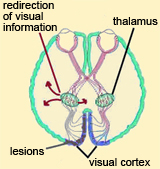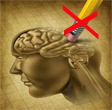Tuesday, 22 September 2015
Seeing without knowing it : the strange phenomenon of blindsight
 This week I’d like to share some information about the fascinating phenomenon of blindsight, along with links to other articles on this subject. People can become blind as the result of damage to the retina, but in rarer cases blindness can occur when both sides of the visual cortex are damaged. The latter situation can lead to the strange phenomenon known as blindsight or unconscious vision, in which people believe that they can’t see anything, but can nevertheless correctly identify the positions of objects in space. If you ask these people where a certain object or point of light is, they will say they don’t know, but if you insist and ask them to take a chance, guess, and point in the direction where they think the object or light might be, most of the time, they’ll point in the right direction. (more…)
This week I’d like to share some information about the fascinating phenomenon of blindsight, along with links to other articles on this subject. People can become blind as the result of damage to the retina, but in rarer cases blindness can occur when both sides of the visual cortex are damaged. The latter situation can lead to the strange phenomenon known as blindsight or unconscious vision, in which people believe that they can’t see anything, but can nevertheless correctly identify the positions of objects in space. If you ask these people where a certain object or point of light is, they will say they don’t know, but if you insist and ask them to take a chance, guess, and point in the direction where they think the object or light might be, most of the time, they’ll point in the right direction. (more…)
Tuesday, 1 September 2015
Memory Loss in Alzheimer’s Reduced for the First Time

On November 4, 1906, German neurologist Alois Alzheimer first described the “particular malady of the cerebral cortex” of his patient Auguste D. Over a century later, this “particular malady” that now bears his name still resists every medication developed so far to treat it: none has yet succeeded in halting the progress of Alzheimer’s disease, or even in slowing it down. At best, some medications reduce some of the disease’s symptoms. In the past decade alone, an estimated $1 billion has been swallowed up by clinical trials of new Alzheimer’s medications, with almost nothing to show for them.
But after decades of disappointment, the tide may be turning at last. A preliminary study published in September 2014 by Dr. Dale Bredesen, in the journal Aging, suggests that the memory losses associated with Alzheimer’s can be reversed through an elaborate 36-point treatment program including dietary changes, exercise, intellectual stimulation and other activities that had already been recognized as Alzheimer’s prevention factors separately. But in this case, it is the unusual step of combining them that seems to have curative value. (more…)







